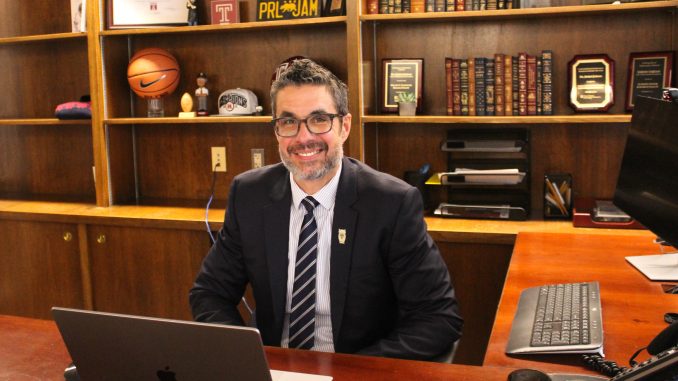
As Temple University’s faculty athletics representative, Jeremy Jordan’s daily tasks include lots of reading and communicating with key university stakeholders. However, he soon realized he had hours of rules and regulations analysis in his near future on top of his already-heavy workload.
While he is still adjusting to the concept, Jordan’s devotion to the university and NCAA keeps him motivated.
“It was a surprise to be honest,” Jordan said. “I didn’t think that they would pick me, but I am happy that they did, and I am excited about the opportunity. I’m a little nervous about the work, but we’ll figure that out.”
His pride for Temple Athletics had blossomed into a role on the NCAA Division I Committee on Infractions, one of college athletics’ most important boards.
Jordan was named to the committee last month and will serve through Aug. 31, 2025, when his term ends. This independent administrative body helps decide infraction cases involving NCAA teams, faculty and athletes. The body also oversees typical problems related to athlete eligibility and other conduct breaches.
As Name, Image and Likeness takes college programs by storm, Jordan’s role on the infractions committee helps schools, like Temple, because he has an inside understanding of the NIL regulations for athletes.
With Temple Athletics undergoing significant change during the past year following the arrival of Vice President and Director of Athletics Arthur Johnson, Jordan’s role at Temple is as crucial as ever. By performing the duties of a top liaison, he is at the forefront of the relationship between the athletic department and university administration.
Jordan, who is also a sports recreation and management professor at Temple, has even taught some of his current coworkers in his classes.
“Jeremy and I started at Temple around the same time,” said Kristy Bannon, executive senior athletic director for compliance and student affairs. “He was actually my first professor that I had in grad school. We go back a very long time.”
Jordan’s pride in Temple Athletics and sports business research led him to co-found Temple’s Sports Industry Research Center in 2008. The center has united sports and business at the university and connected many students to companies and networking events, like the National Football League and Philadelphia Marathon Weekend.
The main reason he is so active in the NCAA is the students themselves.
“Being Faculty Athletic Rep gives me a reason to continue to engage with students,” Jordan said. “It’s fun to see students grow and develop and see them experience success.”
The American Athletic Conference nominated Jordan for his role on the infractions committee because of his long standing knowledge of college athletics. Yet even on a local scale, Jordan aims to enhance Temple students’ experience by connecting faculty members and students.
A major part of Jordan’s role as faculty athletics representative is to align the educational and athletic departments. As a liaison between the different groups, Jordan communicates daily with many of Temple’s key administrators about strategies to improve the student athlete experience between different departments.
Jordan is once again providing the bridge between business, sport and education while fulfilling the liaison role he sought for years with pride, he said.
“Jeremy is just a phenomenal resource for Temple,” said Justin Miller, executive senior athletic director and chief of staff. “He’s passionate about the student athlete experience, he’s passionate about all that Temple has to offer.”
Even though Temple is in a big city and a key state for college athletics, the university’s idea of the student athlete experience serves as a recruiting mechanism for every sport.
Although he will have a lot of reading on his plate for a while, Jordan’s goals for Temple come first, and it all begins with connecting people.
“If a school or college or department or faculty member has an idea or an issue and it’s helpful to connect with athletics, how can I support that,” Jordan said. “Or if athletics has an idea or an issue, how can I connect them across campus, how can I help student athletes understand opportunities available at Temple.”


Be the first to comment